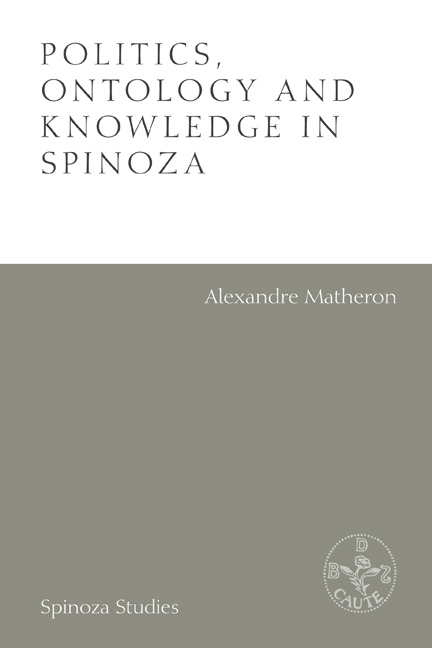Book contents
- Frontmatter
- Contents
- Abbreviations
- Notes on Translation and Acknowledgements
- A Revolutionary Beatitude: Alexandre Matheron’s Spinozism
- I Spinoza on Ontology and Knowledge
- 1 Idea, Idea of the Idea and Certainty in the Tractatus de Intellectus Emendatione and the Ethics
- 2 Essence, Existence and Power in Part I of the Ethics: The Foundations of Proposition 16
- 3 Physics and Ontology in Spinoza: The Enigmatic Response to Tschirnhaus
- 4 The Year 1663 and the Spinozist Identity of Being and Power: Hypothesis on a Development
- 5 Eternal Life and the Body According to Spinoza
- 6 Intellectual Love of God, Eternal Part of the amor erga Deum
- II Spinoza on Politics and Ethics
- 7 State and Morality According to Spinoza
- 8 Ethics and Politics in Spinoza (Remarks on the Role of Ethics IV, 37 Scholium 2)
- 9 Indignation and the Conatus of the Spinozist State
- 10 Passions and Institutions According to Spinoza
- 11 The Problem of Spinoza's Evolution: From the Theologico-Political Treatise to the Political Treatise
- 12 Is the State, According to Spinoza, an Individual in Spinoza’s Sense?
- 13 The Ontological Status of Scripture and the Spinozist Doctrine of Individuality
- 14 Spinoza and Power
- 15 Spinoza and Property
- 16 Spinoza and Sexuality
- 17 Women and Servants in Spinozist Democracy
- 18 The ‘Right of the Stronger’: Hobbes contra Spinoza
- 19 The Theoretical Function of Democracy in Spinoza and Hobbes
- 20 Spinoza and the Breakdown of Thomist Politics: Machiavellianism and Utopia
- Appendix 1 Interview with Laurent Bove and Pierre-François Moreau
- Appendix 2 Chronology of Works by Matheron
- Works Cited
- Index
9 - Indignation and the Conatus of the Spinozist State
Published online by Cambridge University Press: 03 October 2020
- Frontmatter
- Contents
- Abbreviations
- Notes on Translation and Acknowledgements
- A Revolutionary Beatitude: Alexandre Matheron’s Spinozism
- I Spinoza on Ontology and Knowledge
- 1 Idea, Idea of the Idea and Certainty in the Tractatus de Intellectus Emendatione and the Ethics
- 2 Essence, Existence and Power in Part I of the Ethics: The Foundations of Proposition 16
- 3 Physics and Ontology in Spinoza: The Enigmatic Response to Tschirnhaus
- 4 The Year 1663 and the Spinozist Identity of Being and Power: Hypothesis on a Development
- 5 Eternal Life and the Body According to Spinoza
- 6 Intellectual Love of God, Eternal Part of the amor erga Deum
- II Spinoza on Politics and Ethics
- 7 State and Morality According to Spinoza
- 8 Ethics and Politics in Spinoza (Remarks on the Role of Ethics IV, 37 Scholium 2)
- 9 Indignation and the Conatus of the Spinozist State
- 10 Passions and Institutions According to Spinoza
- 11 The Problem of Spinoza's Evolution: From the Theologico-Political Treatise to the Political Treatise
- 12 Is the State, According to Spinoza, an Individual in Spinoza’s Sense?
- 13 The Ontological Status of Scripture and the Spinozist Doctrine of Individuality
- 14 Spinoza and Power
- 15 Spinoza and Property
- 16 Spinoza and Sexuality
- 17 Women and Servants in Spinozist Democracy
- 18 The ‘Right of the Stronger’: Hobbes contra Spinoza
- 19 The Theoretical Function of Democracy in Spinoza and Hobbes
- 20 Spinoza and the Breakdown of Thomist Politics: Machiavellianism and Utopia
- Appendix 1 Interview with Laurent Bove and Pierre-François Moreau
- Appendix 2 Chronology of Works by Matheron
- Works Cited
- Index
Summary
I would like to develop here a hypothesis that I first sketched out in 1986 in order to try to account for an apparent paradox concerning Spinoza’s development from the Theologico-Political Treatise to the Political Treatise. On the one hand, it is evident that in the TP one no longer finds any trace of the still-contractarian explanation with which the TTP had accounted for the genesis of the state. But on the other hand, it is just as obvious that the TP nowhere explicitly gives us any alternative explanation. Spinoza does tell us, in Paragraph 7 of Chapter I, that ‘we must seek the causes and natural foundations of the state, not from the teachings of reason, but from the common nature, or condition, of men’ – that is, quite clearly, from the condition of human beings subject to passions. But the promised explanation does not appear anywhere, and above all not where it should appear, that is, in Chapter II. From this the conclusion is often drawn that Spinoza’s problematic had simply changed, that he had ended up recognising that political society was ‘always-already-there’, and that there was nothing more to say. However, it always seemed strange to me that Spinoza did not seek to explain why, exactly, political society was ‘always-already-there’. This is why I tried a first time, twenty-four years ago, to fill in this lacuna by recourse to the theory of affective imitation expounded in Ethics III. But from this theory, I retained (following, for that matter, an indication Spinoza himself provided in TP I, 5) only the four passions that constitute what could be called the fundamental cycle of interhuman life: pity, ambition for glory, ambition for domination, and envy. The explanation that I gave still seems to me today to be a possible explanation, and even for the most part to be correct. But as such, it has the disadvantage of having to appeal to utilitarian calculations, and not all humans necessarily make this kind of calculation. It thus did not prove, strictly speaking, that – human nature being what it is – political society must necessarily exist. But I now think that in the TP there is a passage, and only one, which, when it is entirely clarified, accounts for this necessity and thus contains the sought-after explanation.
- Type
- Chapter
- Information
- Politics, Ontology and Knowledge in Spinoza , pp. 124 - 135Publisher: Edinburgh University PressPrint publication year: 2020



